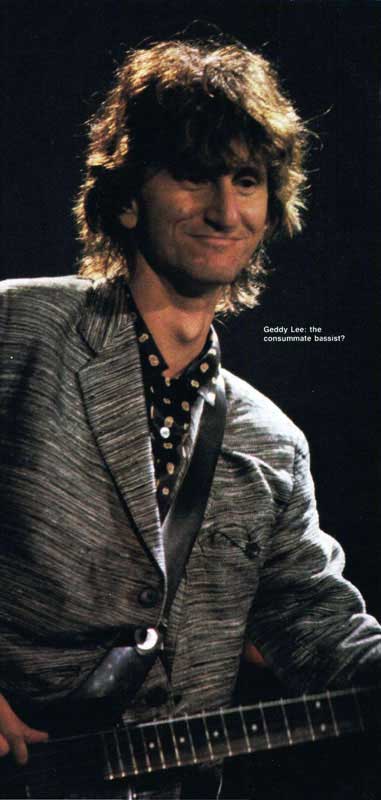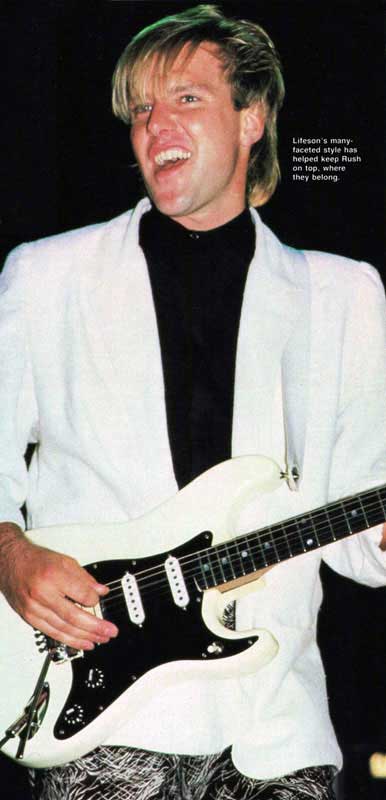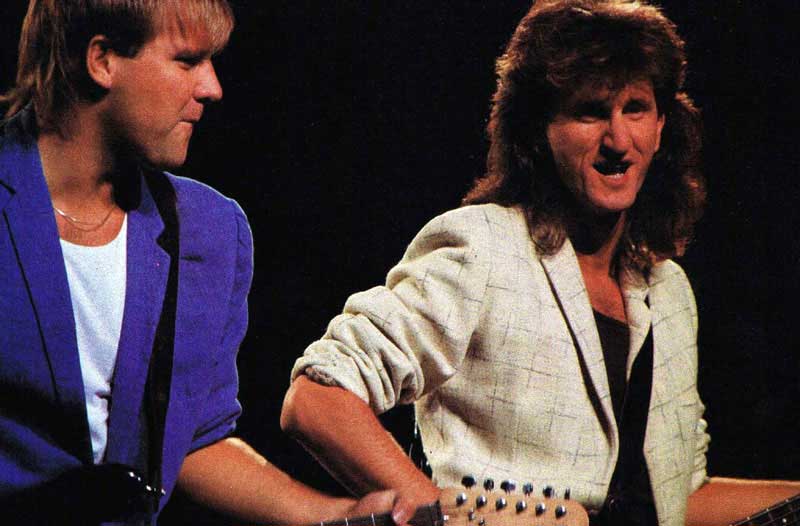It's Those Wacky Guys In Rush
By Daniel Brogran, Creem Close-Up, Metal, September 1986, transcribed by pwrwindows

It's taken Rush more than a decade to win a measure of grudging respect from the rock press. Now, though, Geddy Lee, Neil Peart and Alex Lifeson are discovering that their toughest critics are the ordinary folks who buy records and wait in line for concert tickets.
"Fans may be worse than writers when it comes to being reactionary and totally conservative about what they like and what they don't," says drummer and lyricist Peart. "During one of our early tours of Britain, we had a Police song on the tape we played before the show. And, the audience booed it, because it wasn't' supposed to be cool to like Rush and the Police at the same time."
And now - Katie bar the door! - bands like the Police, U2 and Ultravox have infiltrated Power Windows, Rush's latest album.
"Emotion Detector" has enough U2-ish echo to land a spot on The Unforgettable Fire, and Edge-like guitar riffs chatter out of "Grand Designs." The quiet passages in "The Big Money" could have been a Sting creation (and come to think of it, Sting could've written the lyrics too). African juju rhythms are among the "Mystic Rhythms."
"Absolutely, they're all there," Peart says. "I've always been a big sponge when it comes to influences. And our music has always been open enough to absorb whatever stylistic changes we wanted to make. Our sound is loose enough that there's nothing outside the 'Rush sound,' as far as we're concerned."
As far as fans are concerned, though, is an entirely different matter.
"The levels of intolerance and conservatism are just awesome, even with a group they like," Peart says. "There are people to whom our first four albums are the only good things we've ever done. Then there are the more technically minded people who only like the records we did in our middle progressive period. Everything after that was a sell-out, and everything before was just raw. Then there are people who just like the recent albums."
What those fans are forgetting is that since the days of 2112 and Hemispheres, Rush has always attempted to synthesize disparate forces in rock, be it Led Zeppelin or Yes or Simple Minds. Admittedly, that formula has produced more bombast than boogie, but Peart defends even the failed experiments as "stepping stones to growth."

"We've been working with those influences for the last three or four albums, searching for the right alchemy," he says. "On albums like Signals and Grace Under Pressure, we were still juggling these contrasting things, taking a ska influence and putting it beside a Southern shuffle kind of rhythm. We weren't always successful, but I think we were on the right track." With Power Windows, he says, the modern Rush sound has finally emerged. "There's a cohesiveness to Power Windows that was lacking before," Peart says. "I think we've finally got a balance on these things."
But the failings of the band's recent LPs sprang from more than a simple imbalance of styles. To be blunt, the Canadians seemed overwhelmed by the synthesizers and computers they were incorporating into their sound. Grace Under Pressure, in particular, sounded downright clumsy.
Clearly, drastic measures were needed if Rush hoped to successfully modernize its sound. And so, after 10 years and 12 albums, the band dumped producer Terry Brown and sought help from Peter Collins, the Brit behind Nik Kershaw, Musical Youth, Blancmange and Gary Moore.
After much haggling, Collins forced two big departures on the trio. First, he insisted they abandon their standard practice of recording with the concert stage in mind. "In the past, whenever we tried something in the studio we stopped ourselves and said 'how will we do this live?' Power Windows is the first time we've stepped outside that discipline," Peart says. "Peter convinced us that it was more important to give the songs whatever they wanted or needed, and worry about reproducing it later."
Then Collins brought in a pinch hitter: keyboard wizard Andy Richards. Richards was assigned responsibility for coordinating and programming Power Window's jumble of computers, as well as contributing a few licks - or "events" as he calls them - that were beyond Geddy Lee's modest abilities.
"Andy was great, he really expanded our horizons," Peart says. "His presence sparked us to move in new directions." Collins's innovations gave Rush its most successful - and arguably most accomplished - record to date, but it also made for some big problems when it came time to tour. How would three sets of hands perform what had been created with four sets of hands in a multi-track studio?
"Adding a fourth man to the band is a spectre we've had to face for 10 years," says Peart. "As soon as we began running up against the limitations of three instruments, we began talking about it. This album got the debate going all over again."
But the bottom line, Peart concludes, is that "we like being a trio."

"There's a very good chemistry here," he says. "And we don't want to do anything that might upset what has been a very good balance professionally and personally. If there was a way three of us could pull it off, we decided we were going to find it."
Ironically, the same technology that caused the problems offered a solution.
"Thanks to computers and digital samplers, we were able to store Andy's sounds and effects on floppy disks which can then be triggered and played through Geddy's keyboards," says Peart.
"It took lots of preparation. In fact, we needed more time getting ready for this tour than any other. Geddy had to spend all sorts of time getting everything on disk and getting everything catalogued. But you'll see that we can pull it off. There are plenty of good reasons for going to four people - God knows we've considered them all - but making our own lives easier isn't one of them."
If it seems that technology is getting too good a rap here, let it be known that there are drawbacks. For one, off-stage technicians suddenly become as important as a scuba diver's air tanks. While the musicians are playing one song, the technicians are loading disks for the next.
"Your technician is no longer someone who just fixes something if it breaks - he's intimately involved in your performance," Peart says. "You've got to trust him a lot more than ever before."
But technology's biggest drawback is the spontaneity it robs from a show. With all those buttons to push, there isn't time for much else.
"When we're so busy doing things like programming and loading, it takes away from our freedom and it takes away from the mayhem that's supposed to be a part of rock 'n' roll," Peart says. "There's no doubt about it, spontaneity can definitely be a casualty of the technological revolution.
"But the challenge is what makes it worth it," he adds. "It makes it fun in a different sort of way. We get to the end of the show and there's a certain satisfaction in knowing that just the three of us pulled it off. I think the fans appreciate that too. After all, that's always been our biggest challenge: to see what the three of us can do, not what four or five of us can do."